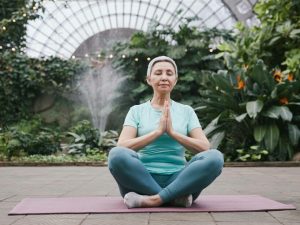
A few weeks after Tipkamol turned twenty-five, she visited her grandaunt, Ratana who lived in a popular riverside village located at the foot of a mountain. Tipkamol had rented a cabin 1km west of her grandaunt’s jungalow and 2km north of the Pia River because her grandaunt; Ratana was all for sweating it out; no air-conditioning. Tipkamol wasn’t ready for a long lecture stating how the world was burning, and air conditioning was undoubtedly a factor in that. She would be reminded that the hydrofluorocarbons, the refrigerants used in a/c units, are far more potent greenhouse gases than carbon dioxide or methane. Grandaunt Ratana was a preservationist; observing the effects of global warming on the tropical environment, and learning about the indigenous Thai people.
After a plate of mushroom soup, bitter greens with tomatoes the size of peas, rare roast beef slices as thin as paper, and noodles in a green sauce, they ate melted cheese served with sweet blue grapes as they sat on Ratana’s wooden floor. They casually drink tea while discussing and laughing out loud until deep into the night. At last, Ratana said, “maybe it’s about time you went to your cabin.” Tipkamol crawled up and walked to the door.
“It’s completely dark outside,” she shrieked and shut the door immediately. Grandaunt Ratana lit the lantern and said, “Why not take this?” Just as Tipkamol was about to take the lamp from her grandaunt’s hands, Ratana blew out the flame. Tipkamol was surprised but she suspected it could be a prelude to one of Ratana’s Zen teachings. Yes, she was right.
 “It is not just another night; in a few hours, the sun will be exactly above the Equator and day and night will be of equal length. It’s another equinox Tipkamol!” Ratana announced excitedly.
“It is not just another night; in a few hours, the sun will be exactly above the Equator and day and night will be of equal length. It’s another equinox Tipkamol!” Ratana announced excitedly.
Grandaunt Ratana held Tipkamol by the hand into the darkness and they walked along an unlit footpath through a field into an open scenery. “Darkness is a thing many have come to fear and shy away from. It has become a metaphor for evil and depression, a place held at bay by our electric-lit world. But we must not shut ourselves from our natural surroundings, we must embrace the novelty of the night. A deep unfamiliar sound roused Tipkamol from her reverie and Ratana told her it was the cronk call of a raven ahead. They continued walking as the breeze caressed their faces.
“The Autumn Equinox is a meaningful time of year to honor the harvest. Whether of a “real” harvest of the things planted in your garden or the harvest of efforts and intentions for your life path that you set earlier in the year,” explained Ratana.
Thick cloud cover prevented the moonlight from illuminating their way ahead. Yet, as their eyes began to get used to the darkness, the landscape around them revealed itself in a new light – albeit a shady one. “Walking at night is a powerful way of reconnecting. When your vision is reduced, your other senses are sharpened,” Ratana stated as the night became chilly and darker.
Tipkamol was so engrossed in her Grandaunt’s talk that she barely knew they were back at her Grandaunt’s half-timbered facade. “Like other seasonal transitions, the autumnal equinox is celebrated in cultures around the world. For instance, a few years ago, I witnessed the Mabon festival celebrated in Thornborough Henges in North Yorkshire. It was such a delight; it typically involved apple picking, feasting, and making an altar for the Celtic god of harvest. Also in Japan, practitioners of Buddhism honour the dead during the six-day holiday of Higan, celebrated during both equinoxes. Indigenous cultures recognized earth-based wisdom and understood that the four focal points of the year: the Winter Solstice, Spring Equinox, Summer Solstice, and Autumn Equinox; are illuminated stages of an inner spiritual journey – a spiritual cycle that the individual takes within themselves,” Ratana expounded passionately.
They both got onto the wooden porch and sat in the recliners as Ratana continued, “The changing seasons are key points in the cycle of life in nature, and within this cycle, many ancient cultures perceived a powerful deeper message for humanity. The many elements of autumn either intrinsically deliver happiness or trigger memories of past joy from which we can keep taking bites, as from a freshly baked apple pie. While we celebrate the seasonal joys, we should remind ourselves that they are blazes on a trail that goes deep into a beautiful forest of wisdom and meaning.”
 “On the Autumn Equinox you may want to honour all that you have in your life and shift your consciousness from one of lack to one of prosperity and gratitude in some ways through a small ritual or ceremony,” she advised.
“On the Autumn Equinox you may want to honour all that you have in your life and shift your consciousness from one of lack to one of prosperity and gratitude in some ways through a small ritual or ceremony,” she advised.
“Would you care to join me for my favorite ritual?” she asked. “I take the 15 minutes before and 15 minutes after the precise moment of the equinox to sit quietly on the ground in thoughtfulness and meditation and open my mind and my senses to the intelligence of nature all around,” Grandaunt Ratana disclosed. “In this time spent in thoughtfulness around the moment of equal light and equal dark, I acknowledge my personal growth cycle and ask for harmony and balance to be the fertilizer in the soil of my life’s garden,” she added.
Ratana went on to prepare the Autumn Equinox ritual on her perfectly rolled lawn. She placed a red candle in the center of a dish, made a circle of salt around the edge, then placed rose petals over the salt. Ratana repeated the process on another side. Some minutes later, she invited Tipkamol into one of the circles. They sat facing each other, cross-legged in a half-lotus position. They took some time to get comfortable, sitting peacefully and breathing in and out to calm their minds. They lit the candles and upon the Autumn Equinox, amid the chilly air, beneath the noble starry black, they observed the beauty of the moon giving thanks. They visualized their minds, bodies, and spirits being cleansed, with new doors opening for them as they transitioned with the planet.


